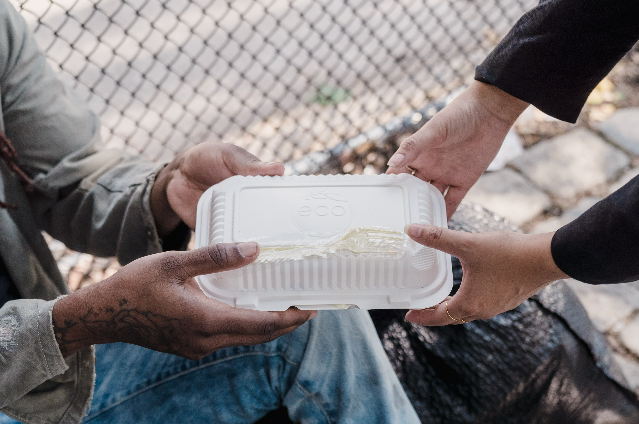
Some stranger encounters lead to some unprecedented initiatives. Such an example is of the 'Indian Roti Bank' (IRB), the concept of which was inspired when an encounter happened with an old hungry woman outside the premises of the Lucknow Railway Station. The concept has gained so much success that it has even crossed the segments of national frontiers and has gained significance in countries such as Nepal or Nigeria.
Every initiative is backed by some noble soul. Here that soul is Vikram Pandey of Hardoi who began this initiative with the slogan, 'Bhukha Na Soye Koi' (Nobody sleeps empty stomach). Vikram Pandey is a 38-year-old graduate from Lucknow University. He recently celebrated the seventh foundation day of the IRB.
In the words of Vikram Pandey, let's hear the story behind this initiative,
'About seven years ago, a woman was begging for alms outside the Lucknow Railway Station. I did not pay attention to her initially but she started crying saying she was hungry. So I took her to a food stall where she ate some six to seven 'puris'. She was completely famished. That day, I was travelling to Delhi and on my way, I kept thinking about that woman. On returning from Delhi, I started feeding the hungry with help from some of my friends way back in Feb, 2016. This led to the establishment of the 'Indian Roti Bank.'
He adds that the local officials also assisted him in his endeavour and then with their help, he started to distribute 'rotis' to the hungry. People started joining the campaign in large numbers and Roti Bank Farrukhabad was started with the slogan, 'Khao Piyo, Raho Aabad-Roti Bank Farrukhabad'. This movement continued to rise.
During the pandemic, the IRB volunteers showed their commitment in providing food to the helpless people.
He adds that he has a dream of establishing a Roti Bank in almost every district of India. Presently, they have more than 100 units working in the country.
On inquiring about the working of IRB, the volunteers collect rotis from families and prepare the vegetables and pack four rotis with a portion of the vegetables, pickles and chilly. These packets are then distributed to beggars and the hungry and needy at railway stations, bus stations and public places, etc.
Volunteers distribute these roti packets on cycles, motorcycles and vehicles. As per the data collected from local officers, it has been revealed that somewhere around 300 rotis are collected from 50-60 families and distributed packets accordingly. On an average, they get some 50,000 rotis from people every week. Not only this, some people also give rice and other food items. The volunteers also take care of the fact that the food they collect is fresh and fit to be in a state of consumption. They also collect the untouched extra food from functions and distribute it to the needy. His campaign is to distribute bread among the poor and that has now become the sole aim of his life. He adds that the organisation runs entirely on public cooperation. Neither a single penny has been invested by the government in the management of the organisation nor any funds or donations have been taken as of yet.
The programme runs into other countries with the help of Whatsapp groups. Many officers who were earlier part of the IRB, after leaving the organisation have come to extend the food services individually. There are even some people who joined IRB first and then after tasting success left it even.
The IRB now has its some 100 branches spread across 14 states and has been successful in providing food to some 12 lakh people.
Food security in India is not merely about the availability of food stuffs in the country. It is also about the affordability and accessibility of those food stuffs in every nook and corner of the world. Proper management of food security dealers is becoming the need of the hour. The enforcement of Public Distribution System and Fair Price shops should be well-equipped with strict vigilance.
. . .
Reference:
- newsindianexpress.com
- economictimes.com
